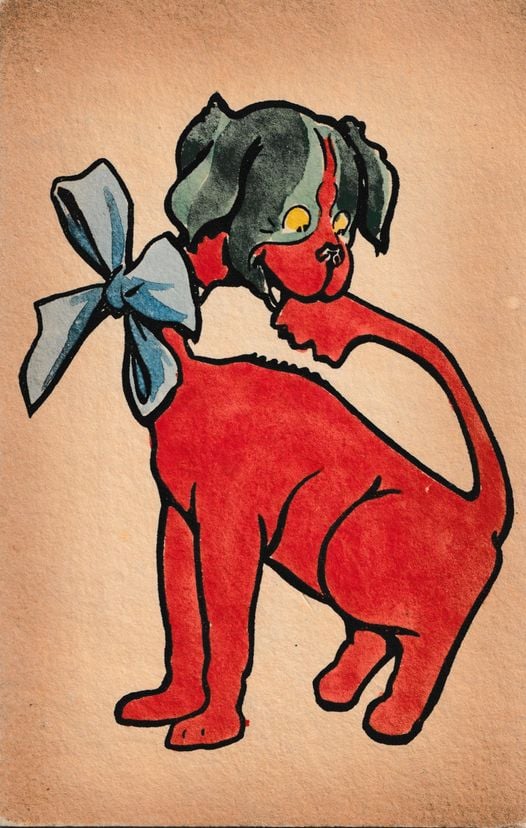Bob Teevan
Dog Bites Tail

This postcard is a bit strange, and it was purchased because it was published by M. M. Vienne – a concern from which I have perhaps a half-dozen cards in my collection. It was printed abroad and bears only the name M. M. Vienne.
The card has no caption, but it is numbered – 364. It appears to be a semi abstract colored illustration of a green faced dog wearing a blue bow and chewing its tale. Similar cards are usually very well drawn illustrations of ladies in hats and have a very soft feel about them. This illustration is however crude and simple and more the type of illustration one would expect to see on a political or propaganda caricature. Since there is very little context, it is wide open to interpretation. Ideas would be welcome.
On the internet I found the following under the title Max Munk (fl. 1900-1917). “An important publisher of artist signed cards that covered a wide range of topics and styles. Their holiday cards and images of women are the best known. Their cards, manufactured in Austria, were originally printed in chromolithography, which they later replaced with a tri-color process. These cards are usually just labelled M. M. Vienne. They also published a few stray postcards for the Detroit Publishing Company.”
The card was likely purchased and just as likely mailed from abroad, it bears a postmark from Geneva, Switzerland, in April 1906. Collectors of a different era have damaged the postage stamp.
Mailed to Rev. F. R. B. Simpson in Combecote, Dartmouth, South Devon, the message it carries is, “Shan’t forgive you if you tear this up! I think it sweet. Back to London tonight. Address c/o Weekes, The Orchard, Devizes.”
Clearly the sender liked the card and surely only a spouse would suggest to a vicar that they “Shan’t forgive you if you tear this up!”
The Reverend Simpson was Francis Russell Benedict Simpson, born in 1880, as the son of Francis Charles Simpson and Marianne Frances Apletre. Francis was a Yorkshire born businessman and the son of a vicar. His wife came from a moneyed family and the Simpsons became significant members of the Dartmouth community.
Finding this family in any census was not easy although they were located in the 1891 when 44-year-old Francis was recorded as an engineer and living with his wife Mary and their five children, a governess, a nurse, a housemaid, a cook, a cook’s maid, an under housemaid, a nursemaid, a footman, and a page. (Clearly the family wasn’t short on funds.)
The children were Francis R. B. (aged 10), Ralph C., Margaret K., Walter A., and Esther M. W.
By 1911 all the children but Walter (a 25-year-old land agent) had left home, yet the household retained six serving staff. No effort was spent on a trace of the children, but a detailed history on some members of the family was found.
Francis (the eldest and to whom the card was addressed) became a vicar and I shall return to him.
Ralph chose the Army as his career and joined the Royal Artillery in 1902. He achieved a promotion to Lieutenant in 1905, and later assumed the surname Apletre in 1913, after the death of his mother in 1912.
Walter went to Trinity Hall, Cambridge in 1904, where he rowed for the college and the university. A newspaper account tells of his being fined two-shillings and six-pence for riding his bicycle without a light in Sidney Street, but this hardly disqualifies him from upstanding citizenship. Walter chose farming as a career but evidently, he decided to seek new challenges, for on May 6, 1911, he arrived in Quebec on the SS Virginian from Liverpool. In 1914 he enlisted in the Canadian Army and was sent to France where the Headquarters of the Canadian Mounted Rifles was shelled on December 1, 1915. The event was recorded as having several fatalities, including Walter.
Returning to Francis R. B. Simpson, in July 1904 he married Edith Mary Seale, a daughter of Sir John Henry Seale, the third Baronet of Mount Boune. Together they had three children. Francis served as a vicar at Dartmouth until 1934.
He died in 1970.
The mention of Devizes reminds me of a limerick: “There was an old man of Devizes/ Who had ears of two different sizes/ The one that was small/ Was of no use at all/ But the other won several prizes.”
I guess, because of the colors & bow, perhaps a Christmas card, maybe a universally characterized artists rendition of a gift.